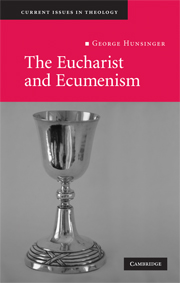Introduction: Ecumenical theology
Published online by Cambridge University Press: 05 June 2012
Summary
Ecumenical theology, as I understand it, differs from both enclave theology and academic theology. Although there are overlaps among these types, let me begin by differentiating them.
Three types of theology
By “enclave theology,” I mean a theology based narrowly in a single tradition that seeks not to learn from other traditions and to enrich them, but instead to topple and defeat them, or at least to withstand them. Enclave theology is polemical theology even when it assumes an irenic façade. Its limited agenda makes it difficult for it to take other traditions seriously and deal with them with fairly. Whether openly or secretly, it is not really interested in dialogue but in rectitude and hegemony. It harbors the attitude that the ecumenical movement will succeed only as other traditions abandon their fundamental convictions, where they are incompatible with those of the enclave, in order to embrace the enclave's doctrinal purity. Because of its temptation to misrepresent or devalue traditions with which it disagrees, such theology is finally divisive and futile. With little chance of success beyond those already convinced, it mainly reinforces the ecumenical status quo. Enclave theology makes itself look good, at least in its own eyes, by making others look bad. It is in danger of what Paul rejected as “party spirit” or “works of the flesh,” namely, enmity, strife, and factionalism (Gal. 5:20). In the ecumenical churches no tradition or communion is immune from this kind of dogmatism.
- Type
- Chapter
- Information
- The Eucharist and EcumenismLet Us Keep the Feast, pp. 1 - 18Publisher: Cambridge University PressPrint publication year: 2008

